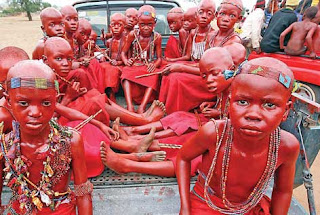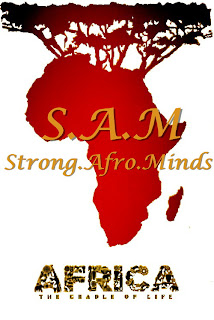Understanding Ourselves - The Meaning and Importance of Initiation
 |
| Limpopo Boy Initiates |
Initiation
is one of the widely practiced practices in Africa. It is a rite of passage
that both boys and girls go through. Rites of passage are an important part of
a person's life because they mark the transition from one stage of life to the
next. They exist because of the four main stages we go through namely birth,
maturation (transition into adulthood), reproduction (marriage and procreation)
and death. They help young people navigate the dangerous period between
childhood and adulthood and have been proven to have a positive psychological
effect on the individual going through it. The absence of rites of passage in
some societies have led to the youth creating their own badges of adulthood
which vary from obtaining drivers licence, 21st birthday celebrations,
experimentation with drugs and alcohol and other dangerous ceremonies. It is
apparent that rites of passage are an important and integral part of the human
psyche and that in their absence, humans will create one.
 |
| Basotho girl initiates |
The
initiation practice marks the transition to adulthood of both boys and girls.
In terms of African Religion, initiation has a legal, spiritual and
psychological significance. Prior to initiation, a boy is not seen as
responsible for his transgressions. His father is responsible for him. When he commits
a transgression his father is the one responsible for any reparations
necessary. In Xhosa there is a saying "ayikathululi" meaning eyes
have not opened and refers to those who have not undergone initiation. Once he
undergoes initiation, he is considered an adult and responsible for his own
transgressions and reparations.
During
the initiation period, the initiates are isolated from the community and are
seen as people who are in limbo, i.e. they are no longer children but are not
adults as yet. During this period they are seen as "inyamazane" and
this is an extremely volatile and vulnerable period.
 |
| Basotho girl initiates |
The shedding
of blood binds the person to the land and ancestors. Prior to initiation the
individual is not seen as alive by the ancestors. The blood shed symbolises that
they are alive and wish to be tied to the community and people they were born
into. The circumcision blood is tantamount to making a covenant, a solemn
agreement between them and their people. So until a person goes through this
operation, he is an outsider. Once the blood is shed, he joins the stream of
his people and becomes truly one with them.
The
cutting of the flesh symbolises the shedding of his youth and the preparation
for his adulthood. If a person has not undergone this practice he will forever
be viewed as a child by his community. He will never be given full
responsibility at home and in the community and his father will remain legally
liable for his transgressions. Once the initiation occurs, he is then ready to
enjoy the full privileges and responsibilities in his family and in the larger
community.
Initiation
is a gateway to marriage; it gives young people an opportunity to prepare for
marriage. The period spent at the initiation school is used to teach them many
things concerning the life of their people, their history, their traditions,
their beliefs, and above all how to raise a family. The mysteries of married
life are normally revealed to the young people at this point, to prepare them
for what is soon to come. Nobody is allowed to get married before going through
initiation.
It is a
central bridge in life as it brings together one’s youth and adulthood, the
period of ignorance and that of knowledge. Separating the person from one life
and joining his to another by getting rid of the early stage of passive life
and integrating it into a productive state and knotting him with the community.
It is initiation which is also a bridge between male and female, fatherhood
with motherhood, since it signals the official permission for one to get
married and bear children. It also joins the living with the departed, the
visible with the invisible, because after initiation a person may perform
religious rituals.
It is a
mark of unity and identification with the people. Through it the individual is
sealed to his people and his people to him. This is a deeply religious step. For
that reason, during the initiation ceremonies and after, the leaders in charge
offer sacrifices or prayers to God and ask for his blessings upon the young
people. In other places the spirits are believed or invited to be present to
witness the occasion. From that occasion onwards, the initiates will forever
bear the scars of what is cut on their organs, and these will be scars of
identity. Through these scars, the initiated are henceforth identified as
members of such a people. Without the identification scars, they cannot be
fully integrated with the people.
Upon
completion, returning home is like a new birth. There is celebration and
rejoice that often involves the community. In some part of Africa, they are
given new clothes, receive presents and new names to show the radical change
they have undergone.






Comments
Email him at.... greatogudugu@gmail.com
whatsApp...+27663492930